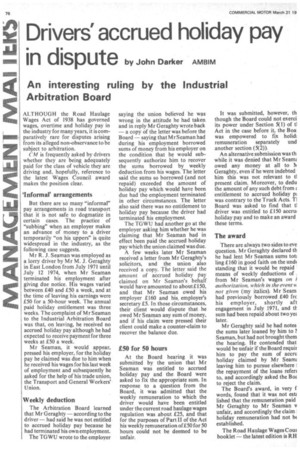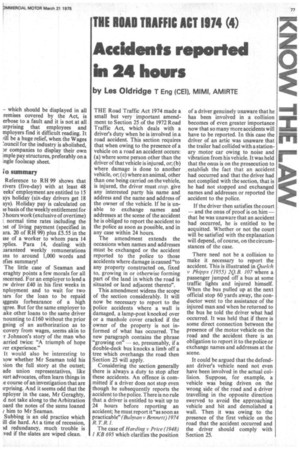Drivers' accrued holiday pay
Page 78

Page 79

If you've noticed an error in this article please click here to report it so we can fix it.
in dispute by John Darker AMBIM
An interesting ruling by the Industrial Arbitration Board
ALTHOUGH the Road Haulage Wages Act of 1938 has governed wages, overtime and holiday pay in the industry for many years, it is comparatively rare for disputes arising from its alleged non-observance to be subject to arbitration.
CM is frequently asked by drivers whether they are being adequately paid for the class of vehicle they are driving and, hopefully, reference to the latest Wages Council award makes the position clear.
'Informal' arrangements
But there are so many "informal" pay arrangements in road transport that it is not safe to dogmatize in certain cases. The practice of "subbing" when an employer makes an advance of money to a driver temporarily "on his uppers" is quite widespread in the industry, as the following case suggests.
Mr R. J. Seaman was employed as a Lorry driver by Mr M. J. Geraghty in East London from July 1971 until July 12 1974, when Mr Seaman terminated his employment after giving due notice. His wages varied between £40 and £50 a week, and at the time of leaving his earnings were £50 for a 50-hour week. The annual paid holiday entitlement was three weeks. The complaint of Mr Seaman to the Industrial Arbitration Board was that, on leaving, he received no accrued holiday pay although he had expected to receive payment for three weeks at £50 a week.
Mr Seaman, it would appear, pressed his employer, for the holiday pay he claimed was due to him when he received his wages for his last week of employment and subsequently he asked for the help of his trade union, the Transport and General Workers' Union.
Weekly deduction
The Arbitration Board learned that Mr Geraghty — according to the driver — had said he was not entitled to accrued holiday pay because he had terminated his own employment.
The TGWU wrote to the employer saying the union believed he was wrong in the attitude he had taken and in reply Mr Geraghty wrote back — a copy of the letter was before the Board — saying that M r Seaman had during his employment borrowed sums of money from his employer on the condition that he would subsequently authorize him to recover the sums borrowed by weekly deduction from his wages. The letter said the sums so borrowed (and not repaid) exceeded the amount of holiday pay which would have been due had the employment terminated in other circumstances. The letter also said there was no entitlement to holiday pay because the driver had terminated his employment.
The TGWU had another go at the employer asking him whether he was claiming that Mr Seaman had in effect been paid the accrued holiday pay which the union claimed was due.
A few weeks later Mr Seaman received a letter from Mr Geraghty's solicitors, and the union also received a copy. The letter said the amount of accrued holiday tiay claimed on Mr Seaman's behalf would have amounted to about £150, and that Mr Seaman owed his employer £160 and his, employer's secretary £5. In those circumstances, their client would dispute that he owed Mr Seaman any sum of money, and if his claim were pressed their client could make a counter-claim to recover the balance due.
£50 for 50 hours
At the Board hearing it was submitted by the union that Mr Seaman was entitled to accrued holiday pay and the Board were asked to fix the appropriate sum. In response to a question from the Board, it was admitted that the weekly remuneration to which the driver would have been entitled under the current road haulage wages regulation was about £25, and that for the purposes of Part II of the Act his weekly remuneration of £50 for 50 hours could not be deemed to be unfair. It was submitted, however, th though the Board could not exerci its power under Section 5(1) of t1 Act in the case before it, the Boa was empowered to fix holid remuneration separately und another section (5(2)).
An alternative submission was th while it was denied that Mr Seam owed any money at all to N Geraghty, even if he were indebted him this was not relevant to ti present claim. Moreover, to dedu the amount of any such debt from entitlement to accrued holiday p was contrary to the Truck Acts. T1 Board was asked to find that t1 driver was entitled to £150 accrth holiday pay and to make an award these terms.
The award
There are always two sides to eve question. Mr Geraghty declared th he had lent Mr Seaman sums tot ling £160 in good faith on the unlit standing that it would be repaid means of weekly deductions of from Mr Seaman's wages on I authorization, which in the event w not given (my italics). Mr Seam had previously borrowed £40 frc his employer, shortly aft engagement in July 1971, and tF sum had been repaid about two ye later.
Mr Geraghty said he had notes the sums later loaned by him to I Seaman, but had not brought them the hearing. He contended that would be unfair if the Board requil him to pay the sum of accru holiday claimed by Mr Seam leaving him to pursue elsewhere I the repayment of the loans refer] to, and accordingly asked the Bok to reject the claim.
The Board's award, in very f words, found that it was not esti lished that the remuneration paid Mr Geraghty to Mr Seaman v unfair, and accordingly the claim holiday remuneration had not bt established.
The Road Haulage Wages Com booklet — the latest edition is RH which should be displayed in all remises covered by the Act, is erbose to a fault and it is not at all urprising that employees and mployers find it difficult reading. It rill be a huge relief, when the Wages :ouncil for the industry is abolished, )r companies to display their own imple pay structures, preferably on a tngle foolscap sheet.
1.0 summary Reference to RH 99 shows that rivers (five-day) with at least 48 eeks' employment are entitled to 15 ays holiday (six-day drivers get 18 ays). Holiday pay is calculated on ie basis of the weekly entitlement for ) hours work (exclusive of overtime) normal time rates including the )st of living payment (specified in ara. 20 of RH 99) plus £5.55 in the ise of a worker to whom para 14 'plies. Para 14, dealing with laranteed weekly remunerations• ins to around 1,000 words and :lies summary!
The little case of Seaman and eraghty points a few morals for all mcerned. For an employer to lend a :w driver £40 in his first weeks in nployment and to wait for two :ars for the loan to be repaid 'nests forbearance of a high :gree. But for the same employer to ake other loans to the same driver nounting to £160 without the prior gning of an authorization as to :covery from wages, seems akin to r Johnson's story of the man who ,arried twice: "A triumph of hope ver experience."
It would also be interesting to low whether Mr Seaman told his lion the full story at the outset; ade union representatives, like )urt advocates, often learn things in te course of an investigation that are trprising. And it seems odd that the nployer in the case, Mr Geraghty, d not take along to the Arbitration oard the notes of the sums loaned / him to Mr Seaman.
Subbing is an old practice which ill die hard. At a time of recession, id redundancy, much trouble is .ved if the slates are wiped clean.








































































































































